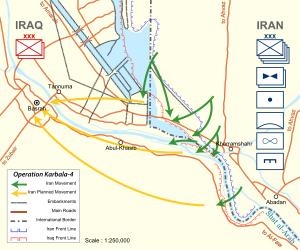Operation Karbala-4
| Operation Karbala-4 | |||||||
|---|---|---|---|---|---|---|---|
| Part of the Iran–Iraq War | |||||||
 |
|||||||
|
|||||||
| Belligerents | |||||||
|
|
|
||||||
| Commanders and leaders | |||||||
|
|
|
||||||
| Units involved | |||||||
| 3rd Corps 7th Corps |
Najaf Corps Quds Corps Karbala Corps Nouh Corps |
||||||
| Strength | |||||||
| unknown | 60,000 | ||||||
| Casualties and losses | |||||||
| 2,000 | 12,000 4,000 captured |
||||||
|
|
Iraqi victory
Operation Karbala-4 was an Iranian offensive in the Iran-Iraq War on the southern front. The operation was launched after the failure of Operation Karbala-2 and Operation Karbala-3 to move the Iraqi lines in an effort to capture Iraqi territory.
The battle itself was planned and eventually executed by Ali Akbar Hashemi Rafsanjani. The operation would be launched under cover of darkness in order to gain a foothold along the Arvand Rūd/Shatt-al-Arab waterway. Once across, the Iranian forces would go on the offensive and eventually move onto the port city of Basra. The attack would be launched towards the Umm ar-Rasas Island in the Shatt al Arab. It most likely was meant as a diversionary attack before the upcoming Operation Karbala-5 (although it may have been called that only after it failed). It would attack from Umm ar-Rasas island to other islands and roads to help create a broad encirclement of Basra. It may have been rushed ahead to intimidate the Islamic Summit Conference meeting in then Iraqi ally Kuwait.
...
Wikipedia
